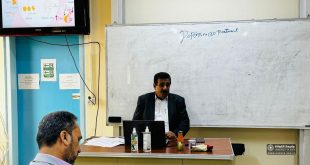Within a British, Chinese, Cypriot scientific team Teaching publication in the branch of Microbiology / Faculty of Veterinary Medicine (lecturer. Dr . Mohamed Taleb Mohamed) scientific research in the journal (Clinical Immunology) The research was titled (The production of autoantibodies equivalent to IL-33 selectively improves the response to asthma and its severity) with an impact Factor (Impact Factor 8.6) and a site score(Cityscire 12.4). The study aimed to investigate autoantibodies to cytokine IL-33 In the blood of serum of asthmatic patients, its immunological functions and clinical effects are studied.
The study found that the production of these antibodies in some asthma patients may improve the immune response to the disease and may also improve lung function.
Abstract
Background
Natural anti-cytokine autoantibodies can regulate homeostasis of infectious and inflammatory diseases. The anti-cytokine autoantibody profile and relevance to the pathogenesis of asthma are unknown. We aim to identify key anti-cytokine autoantibodies in asthma patients, and reveal their immunological function and clinical significance.
Methods
A Luciferase Immunoprecipitation System was used to screen serum autoantibodies against 11 key cytokines in patients with allergic asthma and healthy donors. The antigen-specificity, immunomodulatory functions and clinical significance of anti-cytokine autoantibodies were determined by ELISA, qPCR, neutralization assays and statistical analysis, respectively. Potential conditions for autoantibody induction were revealed by in vitro immunization.
Results
Of 11 cytokines tested, only anti-IL-33 autoantibody was significantly increased in asthma, compare to healthy controls, and the proportion positive was higher in patients with mild-to-moderate than severe allergic asthma. In allergic asthma patients, the anti-IL-33 autoantibody level correlated negatively with serum concentration of pathogenic cytokines (e.g., IL-4, IL-13, IL-25 and IL-33), IgE, and blood eosinophil count, but positively with mid-expiratory flow FEF25–75%. The autoantibodies were predominantly IgG isotype, polyclonal and could neutralize IL-33-induced pathogenic responses in vitro and in vivo. The induction of the anti-IL-33 autoantibody in blood B-cells in vitro required peptide IL-33 antigen along with a stimulation cocktail of TLR9 agonist and cytokines IL-2, IL-4 or IL-21.
Conclusions
Serum natural anti-IL-33 autoantibodies are selectively induced in some asthma patients. They ameliorate key asthma inflammatory responses, and may improve lung function of allergic asthma.
 Faculty of Veterinary – University of Kufa Official Site – Faculty of Veterinary
Faculty of Veterinary – University of Kufa Official Site – Faculty of Veterinary

